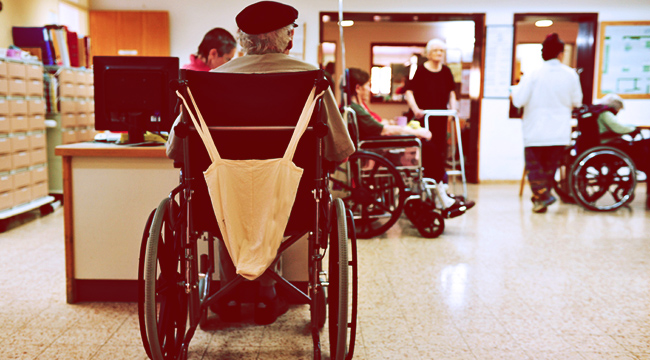
The American Health Care Act, which squeaked through the House of Representatives on Thursday, is terrible for many Americans in many ways. But what’s gotten almost no attention is the horrendous effect it could have on Americans in nursing homes.
Daniel Webster, a Republican representative from the 11th Congressional District in central Florida, acknowledged this when he announced he would vote for the AHCA.
“I have been very concerned about Florida’s Medicaid-funded nursing home beds,” Webster said. “These are critical to the access some of our senior population has to our nursing homes.”
Webster explained he was only willing to vote yes because President Donald Trump, Vice President Mike Pence and the House of Representatives’ GOP leadership promised that they would find some way to deal with the potential disaster created by the bill. It will now go to the Senate, and if some version of it is passed there, will then have to be reconciled with the House bill for a final vote.
Many middle-class Americans are unaware that the huge cost of nursing home care — which in some areas can run over $100,000 a year — is not covered by Medicare. Those who need it and cannot pay for it themselves can generally receive coverage from Medicaid, though they usually must spend down all their savings first.
When all is said and done, Medicaid pays the bills for over 60 percent of nursing home residents — people who cannot care for themselves and without Medicaid would have literally nowhere to go.
But the AHCA slashes $880 billion dollars from Medicaid spending over the next ten years, or about one-sixth of the $5 trillion it would otherwise cost the federal government. (While these seem like enormous numbers, the U.S. economy is so big that even $5 trillion will be just about two percent of the gross domestic product over the next decade.)
The bill accomplishes these cuts in part by changing Medicaid from an entitlement, in which the federal government automatically provides states with funding based on the needs of their population, to either a block grant or a per capita allocation (at the state’s choice).
The amount states will receive per capita will be set at the average cost for recipients in 2016. It then will increase at the Consumer Price Index’s rate of medical inflation until 2020, when it will begin going up at the CPI medical rate plus one percent. While this sounds reasonable, it will inevitably have serious consequences over the next 20 years due to the aging of the baby boom generation.
This year someone born in 1950 will turn 67 years old, and probably doesn’t need nursing home care. In 2037 they will turn 87, and will be far more likely to do so.
Nursing care is one big reason Medicaid recipients over 85 cost the program 2.5 times more than those who are between the ages of 65 and 74. If Medicaid were to remain an entitlement, states would automatically receive increased federal funds to cover these greater costs as baby boomers age. Under the AHCA, the per-capita payments to states will increase far too slowly to cover them.
Precisely how much of a catastrophe the AHCA could be is impossible to say as of now, since Republicans passed the bill without first having it scored by the Congressional Budget Office. But there’s little question it will be disastrous if anything like it becomes law. This didn’t matter to Republicans in the House. The question now is whether it will matter at all to Republicans in the Senate.
The post House GOP Just Voted to Slash Medicaid — Which Pays for 60 Percent of People in Nursing Homes appeared first on The Intercept.
